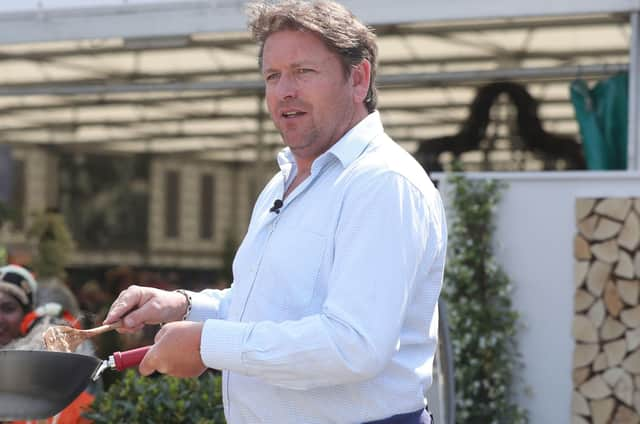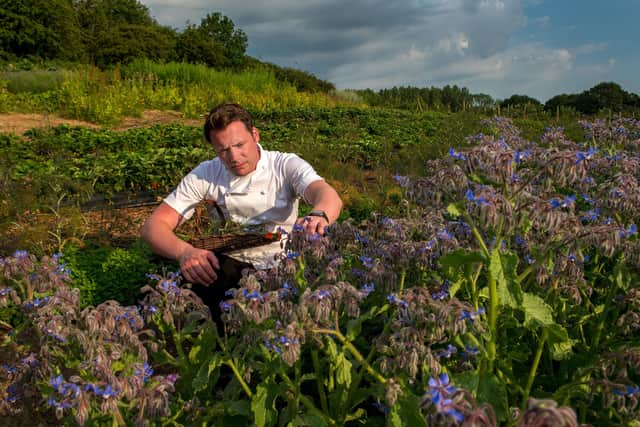James Martin says ‘we’ve only ourselves to blame’ on sustainablity of the restaurant industry


A stark picture has emerged as the UK is growing less produce, with self-sufficiency levels in fruit and vegetables steadily falling since the 1980s.
Just under 40 years ago, the nation produced 78 per cent of its food needs, according to the National Farmers’ Union, but today, that figure sits at just 64 per cent.
Advertisement
Hide AdAdvertisement
Hide AdCelebrity chef James Martin, who is from Malton in North Yorkshire, grew up on a farm and is under no illusion of the difficulty of making the UK more self-sufficient when it comes to food production.


He told The Yorkshire Post: “We don’t grow anywhere near enough food to enable us to be self-sufficient even if we did just eat seasonal produce.
“The British public are used to having cheap food and a massive choice all year round and I just don’t think they would pay the cost for something that was produced locally and seasonally.
“The Italians, the Spanish and French are prepared to pay for great produce, but the Brits just aren’t.
Advertisement
Hide AdAdvertisement
Hide Ad“They want cheaper and cheaper prices and that’s what’s happening in the supermarkets and so the small suppliers don’t get a chance to compete.
“To understand food properly is to understand how difficult it is to produce. We only have ourselves to blame.
“The smaller restaurants might be able to become self-sufficient, but I have an 85-room hotel doing 450 covers a day. How is my veg plot supposed to feed all those people ?
“It just isn’t possible to grow enough food to feed all my guests however much I might want to.
Advertisement
Hide AdAdvertisement
Hide Ad“I am all for helping the environment – I’ve just bought an electric car – but there’s talking about it and doing it.
“It’s much easier just to talk about it, things have got to change.”
The national production capacity is so small that analysis from the Food Foundation shows if everyone in the UK tried to eat their five-a-day from the current yield, the produce needed would fall short by 2.1m tonnes annually.
But ever aware of the part they play, many restaurateurs are trying to do their bit to become as self-sufficient as possible.
Advertisement
Hide AdAdvertisement
Hide AdTommy Banks is leading the way when it comes to making his Michelin-starred restaurants in Yorkshire, The Black Swan at Oldstead and Roots in York, sustainable.
The majority of produce used in both kitchens is grown on his family farm or in the greenhouse behind the Black Swan, while the rest is from small local suppliers – often the fruit and vegetables no-one else wants.
But it is the way the produce is used that makes Mr Banks a sustainability star – he has an antipathy for food waste and uses every part of the produce grown in his family’s farm.
From using one Hispi cabbage to feed 16 people – the outside leaves are used as wraps at the Black Swan, while the hearts are roasted at Roots – to the waste whey, from homemade cheese using raw milk, which is used four times across two savoury dishes, in ice cream, and caramelised and grated on top of carrots.
Advertisement
Hide AdAdvertisement
Hide Ad“Sustainability is at the core of our ethos,” said Mr Banks, whose cookery book Roots explains his view on the seasons, especially the need to preserve food when it is abundant on the farm.
“We source most of our produce from my parents’ farm, which uses sustainable farming practices, with 30 acres dedicated to the restaurant, and the rest of our produce sourced from like-minded suppliers.”
And his work on sustainability has not gone unnoticed.
Earlier this year, the Michelin Guide created a new accolade to recognise restaurants that were going above and beyond when it comes to sustainability.
The Michelin Green Star was awarded to just 23 restaurants and the Black Swan was one of them.
Advertisement
Hide AdAdvertisement
Hide AdGwendal Poullennec, the international director of the Michelin Guides, said having a new award dedicated to sustainable gastronomy “shows that our recognition of restaurants goes beyond the search for the best cooking”.
He added: “It enables us to also turn the spotlight on those with a great sense of responsibility towards the environment.”
And Michelin is not the only organisation taking the need to protect the planet seriously.
The Sustainable Restaurants Association, which has big names such as Raymond Blanc and Prue Leith at its helm, aims to accelerate change towards an environmentally and socially progressive hospitality sector.
The SRA works with businesses from across the food industry as well as campaign groups and businesses that supply restaurants through its Food Made Good programme.
Comment Guidelines
National World encourages reader discussion on our stories. User feedback, insights and back-and-forth exchanges add a rich layer of context to reporting. Please review our Community Guidelines before commenting.